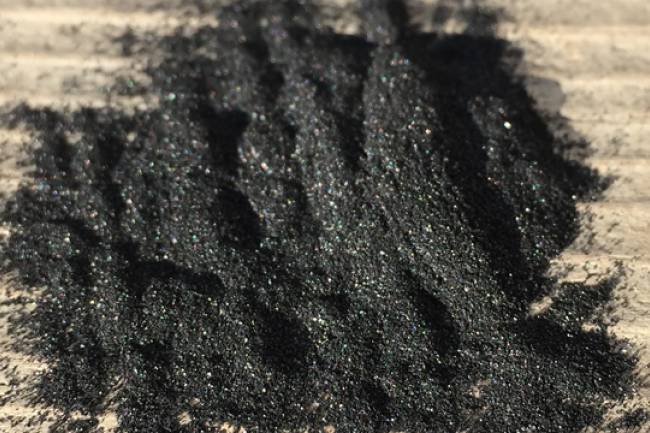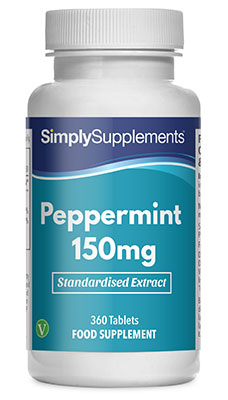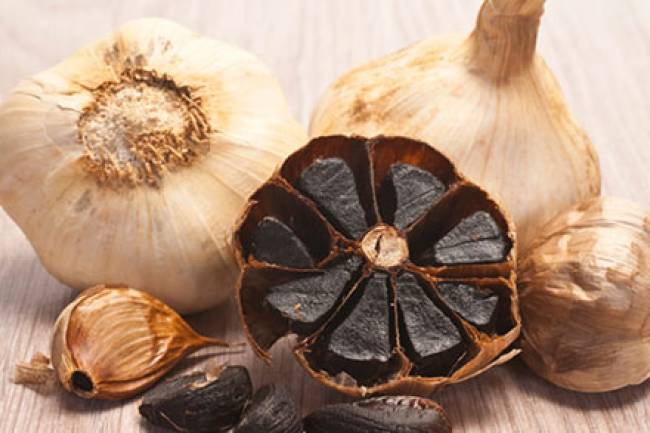How to Use Peppermint for Bloating
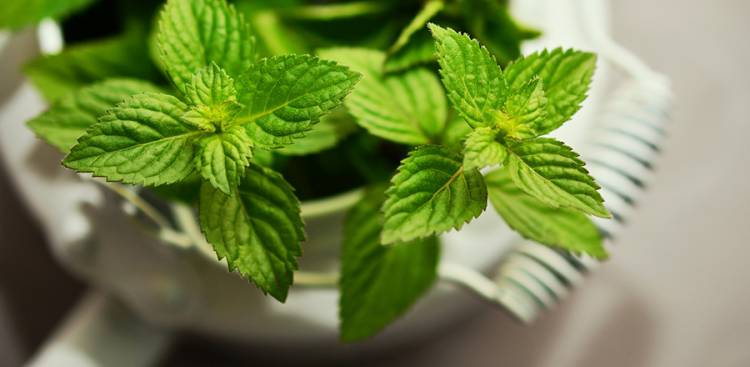
Peppermint is a wild plant, found growing in damp areas in many parts of the world. It has been used for centuries as a natural remedy for digestive upsets such as bloating, discomfort and indigestion. But is there any scientific truth behind its use or is it, like some other herbal remedies, little more than a placebo?
What Causes Stomach Bloating?
Most of us have experienced some degree of bloating on occasion. Despite how common the experience may be among the general population, it is odd to report that, as yet, the scientific community cannot entirely agree on the most likely cause of bloating.
Based on the wealth of scientific studies carried out to date, it seems likely that a range of different issues may lead to the condition we experience as bloating. One extensive study of the issue suggested that just a few of the most likely potential causes include an oversensitive gut that “twitches” or “spasms” and imbalances in gut flora (a lack of “friendly bacteria”).
Does Peppermint for Bloating Actually Work?
 Thanks to the historical use of peppermint for digestive upsets there have been a fair number of scientific investigations designed to assess its effects. In one study of men suffering from digestive problems the volunteers were either provided with peppermint tablets or a placebo, in order to measure the impact both substances had on feelings of swelling and bloating.
Thanks to the historical use of peppermint for digestive upsets there have been a fair number of scientific investigations designed to assess its effects. In one study of men suffering from digestive problems the volunteers were either provided with peppermint tablets or a placebo, in order to measure the impact both substances had on feelings of swelling and bloating.
While the placebo group reported a 29% improvement in digestive sensations, the peppermint group experienced a far more significant impact of 83%. Put another way, it seems that under these experimental conditions peppermint was almost three times more effective at reducing digestive issues than doing nothing at all.
In another study, a group of volunteers were provided with peppermint capsules to take 15-30 minutes before eating a meal. This meant that most volunteers consumed 3-4 capsules per day. After a period of four weeks each participant was asked to report back on their experiences. The results showed that 83% of those individuals taking peppermint experienced less bloating, and that 79% also reported an alleviation of abdominal pain after eating.
A meta-analysis is considered to be the “gold standard” of scientific investigation. In such a study, scientists collate the results from dozens of other previous experiments carried out by multiple scientists around the world. Such results, when collected in this manner, help to produce a more comprehensive overview of the subject in question, by eliminating any bias or outliers that may influence the results of any single experiment.
Fortunately, just such an analysis has been carried out on the potentially beneficial effects of peppermint on digestive issues such as bloating. In total the meta-analysis gathered the results from nine different experiments involving an impressive 726 volunteers. The experts found that even such a pooled results showed quite stark improvements in symptoms of irritable bowel syndrome (IBS) including stomach bloating. Their findings indicated that peppermint is “significantly superior to placebo” in all IBS symptoms. Improvements were shown in a wide variety of digestive issues, including abdominal pain, discomfort, bloating, diarrhoea and constipation.
The research to date has been so hopeful that peppermint has now started to be tested in other areas of medicine. For example, antispasmodic drugs are typically used when carrying out endoscopies, to ensure that the gut wall doesn't move during examination.
Recently, however, some authorities have begun to experiment with peppermint as a more natural alternative to these drugs. In 8,269 endoscopies that used either no drug treatment, peppermint oil or the standard antispasmodics, it was found that peppermint oil performed equally well as the other drugs, and in older patients actually worked better than the standard treatments.
This really helps to underline not just how effective peppermint is at calming the stomach, but increasingly how accepted it is becoming in the medical community.
How Does Peppermint Help Bloating?
The science seems pretty clear; peppermint certainly does seem to positively impact a variety of digestive conditions including bloating. But if the results seem so clear, then the next question is what do the experts believe is really leading to this impact?
Studies of the various naturally-occurring compounds to be found within peppermint suggest that it is the oils - collectively known simply as “peppermint oil” - that seem to be having the medicinal impact. Studies have placed peppermint oil into a group of compounds known as “spasmolytics”. In order to explain what this means, and why it is important, we need to understand how muscles work at a very basic level…
You will probably know that calcium is crucial for healthy bones and teeth, but you might not realize that it also plays a crucial role in muscle contraction. Without getting too technical, when calcium is absorbed into the muscles from your blood the muscle in question begins to contract. As this calcium begins to dissipate once again, so the muscle starts to relax.
While this same process occurs all around the body, with calcium being continually shuttled in and out of muscles to make them function, this same process also occurs within the gut. After all, food doesn't travel through your digestive system by gravity alone; instead your gut can be thought of as a muscle-lined tube through which food is gently forced.
Studies indicate that many IBS sufferers, and those experiencing temporary digestive issues, suffer from an overactive digestive tract. In essence, the muscles lining the digestive wall can go into spasm, leading to discomfort and bloating.
Peppermint has been shown to contain a chemical known as “monoterpene” which actually blocks the uptake of calcium. In doing so, it physically prevents the digestive tract from twitching, leading to improvements in the symptoms of IBS. Put simply, it seems that peppermint oil blocks the chemical reaction that otherwise leads to an overreaction in the gut and the bloating this can cause.
Side Effects & Problems
While numerous scientific studies have indicated positive improvements in the sensation of stomach bloating, it is also worth mentioning that some side effects have been experienced by users. While these are typically quite minor, and soon pass, all the same you may want to bear these in mind when deciding whether peppermint is the right solution for you.
The most common side effect experienced was heartburn, though it is reported to be “mild and transient in nature”. This, of course, makes perfect sense. The same ingredients that can relax the muscles in the gut wall can also relax the sphincter muscles that prevent stomach acid from rising up the oesophagus.
Interestingly, as a way to limit the experience of heartburn when taking peppermint, most modern supplements now carefully coat their capsules or tablets. This is believed to reduce the risk factor of acid reflux, ensuring the beneficial compounds are only accessible to the body after they have passed through the stomach itself.
How to Take Peppermint for Bloating
Peppermint is available in a number of forms. Historically, peppermint was used to make a tea, which could be consumed as required to calm the stomach. While this is possibly still the most popular manner in which to self-medicate, there are a number of important points to bear in mind.
Firstly, the oil content of plants grown in different conditions may differ, meaning that the use of leaves themselves can result in differing results each time. Additionally, it is worth highlighting that while a single dose of peppermint may help to reduce stomach bloating, there is also evidence that the impact grows over time.
For example, in a study in which IBS sufferers were prescribed peppermint to be taken three times a day for six weeks, not only did the beneficial impact of peppermint increase over the study period, but the results then slowly tailed off over the following fortnight once peppermint consumption was ceased. 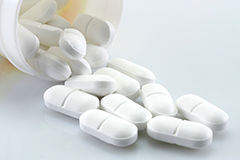 This means that for individuals suffering regularly from stomach bloating it may actually prove more beneficial to take it on a consistent, ongoing basis just as one might with a multivitamin tablet.
This means that for individuals suffering regularly from stomach bloating it may actually prove more beneficial to take it on a consistent, ongoing basis just as one might with a multivitamin tablet.
Another option for taking peppermint, which may prove more practical for many people, is the use of peppermint tablets or capsules. Combining the active ingredients from a wide range of different peppermint plants, such supplements can lead to more reliable, predictable results. Furthermore, it is much easier to simply swallow a capsule just before each meal than it is to boil up fresh peppermint leaves.
When taking peppermint in either tablet or capsule form you are advised to swallow these whole with a glass of water. The evidence seems to suggest that chewing of the tablets significantly increases the chances of side effects such as acid reflux.
What Else Can I Do for Bloating?
Peppermint is just one potential treatment for stomach bloating. While there is a wealth of research to highlight its efficacy, only very rarely does the same solution work for everyone.
If you're struggling with regular bloating then there are a whole host of potential remedies. For example, there is growing evidence that another factor in cases of stomach bloating may be an imbalance in the gut bacteria that aid the digestion of our food. One scientific analysis claimed that “bacterial reconstitution” can be beneficial.
Put into plain English, the use of probiotics can prove beneficial in many people. Furthermore, such substances can be used alongside other remedies like peppermint for an even greater overall impact. A second option for the treatment of bloating can be the use of so-called “low FODMAP” diets. FODMAP is an acronym that stands for “fermentable oligosaccharides, disaccharides, monosaccharides and polyols”.
As the name suggests, this process involves changing the diet so as to minimize the consumption of foods demonstrated to worsen feelings of bloating or more general IBS. You'll find detailed information on the low FODMAP diet here.
Conclusion
The evidence to date suggests that our forebears really did know a thing or two about which plants helped with digestive upsets like bloating. It seems, from the data available, that peppermint oil can have a calming effect on the gut, helping to relieve feelings of discomfort.
Used as a tea, or even better in supplement form, consider taking peppermint as a preventative measure roughly half an hour before eating.
If you're already suffering from bloating then peppermint may also serve as a natural short-term solution.
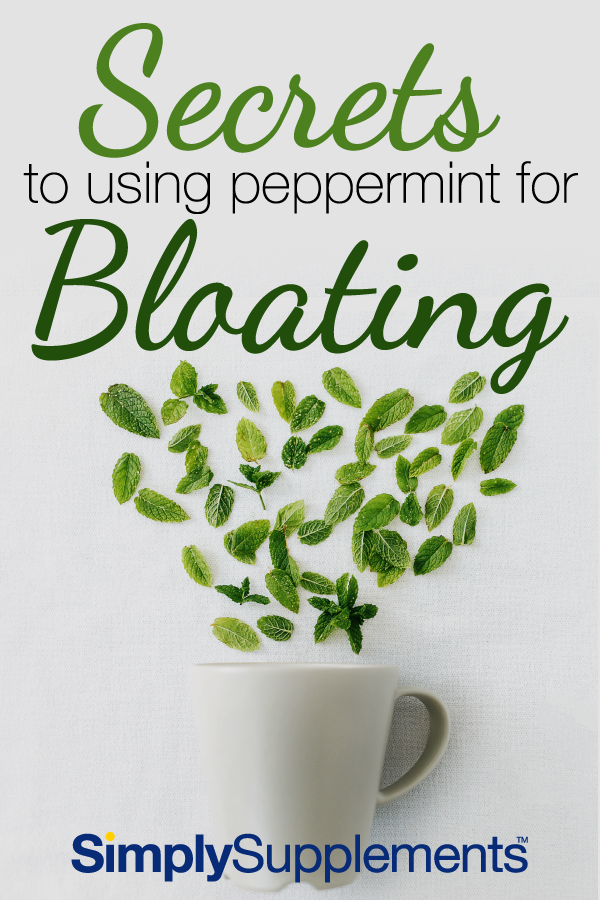
Sources:
http://onlinelibrary.wiley.com/doi/10.1111/j.1365-2036.2011.04637.x/full
https://journals.lww.com/jcge/Abstract/2014/07000/Peppermint_Oil_for_the_Treatment_of_Irritable.11.aspx
https://digitalcommons.pcom.edu/pa_systematic_reviews/266/
https://www.ncbi.nlm.nih.gov/pmc/articles/PMC3816178/
https://link.springer.com/article/10.1007/s11938-006-0013-8
https://medicinetoday.com.au/2015/april/feature-article/abdominal-bloating-it-all-gas
https://link.springer.com/article/10.1007/BF02936952
http://europepmc.org/abstract/med/23416804
https://link.springer.com/article/10.1007/s10620-012-2194-4

 Nicole
Nicole 